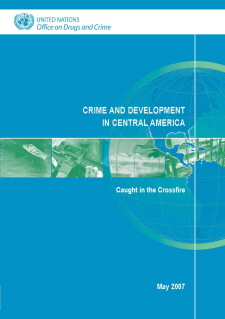Central America's stability and development is being thwarted by crime and violence, much of it caused by the drug trade, the United Nations Office on Drugs and Crime (UNODC) said in a report released Wednesday. However, the report called for an intensification of the prohibitionist policies that helped create the problems in the first place.

"The warning signs are evident in this report -- gun-related crime, gang violence, kidnapping, the proliferation of private security companies," said UNODC executive director Antonio Maria Costa in a press release accompanying the report. "But these problems are in no way inherent to the region. They can be overcome."
Sandwiched between the coca and cocaine producing regions of South America and the insatiable market for cocaine in North America, Central America sees nearly 90% of cocaine headed north. While little of it falls off the truck -- Central American usage rates are low, according to UNODC -- violence and corruption associated with the black market drug trade take their toll.
"Where crime and corruption reign and drug money perverts the economy, the State no longer has a monopoly on the use of force and citizens no longer trust their leaders and public institutions," Mr. Costa said, underscoring that development is stunted where crime and corruption thrive. "As a result, the social contract is in tatters and people take the law into their own hands."
Countries in the region and beyond need to work together to strengthen their criminal justice systems, and break the links between drugs, crime, and underdevelopment, the UNODC advised. "Cooperation is vital," Costa said. "The problems are too big, too inter-linked and too dangerous to be left to individual states."
But rather than revising the global drug prohibition regime that generates the huge black market flows of cash, drugs, and guns at the root of many of Central America's problems, Costa and the UNODC simply call for more of the same. "We have a shared responsibility and common interest in helping the countries of Central America to withstand external pressures and to strengthen their internal resistance to the damaging effects of drugs and crime," Costa said. "Let us unlock the potential of this region."
If Costa and the UNODC suffer from tunnel vision when it comes to drug prohibition, at least they displayed a nuanced understanding of the youth gangs or "maras" that are so quickly demonized in the press. "Heavy-handed crackdowns on gangs alone will not resolve the underlying problem. Indeed, it may exacerbate them," Costa noted. "Gang culture is a symptom of a deeper social malaise that cannot be solved by putting all disaffected street kids behind bars. The future of Central America depends on seeing youth as an asset rather than a liability."
Comments
Prohibitionist policies
The U.N. is the problem. They can't fight their way out of a paper Bag!
The United Nations is NOT the problem!
I know that with Koffe Anan's rocky reputation that UN bashing is common, and often deserved. At the same time, however, it's easy to label institutions, just as we label people from time to time. TWere you aware that he United Nations has stopped over 100 regional conflicts, gotten involved in over 50 peacekeeping missions and distinguished itself above all others in areas of health, education and poverty relief? I just wish that more Americans would buy into world peace, and in the words of John Lennon "just give peace a chance."
Scott Tudehope
Teacher
Southern California
U.N.
Corrupt!
U.N.
The problem is that the U.N. is mearly attempting to address the symptoms of the problem (violence of drug cartels), rather than attacking the underlying problem (drug prohabition). Americans partially came to understand this in the 1920s when alcohol prohibition was enacted in an attempt to morally clean up society. With the raise of moon-shiners and large organized mobs/gangs, Americans soon came to the realization that prohbition was creating far more societal problems than the drugs were causing themselves....and thus reapealled alcohol prohibition. Only if people would come to realize that this is no different for any other drug.
Drug prohibition provides the means by which large crime-organizations/terrorist groups accrue their money.....Example: Al Queda funds its opperation from the production and manufature of opium. Its easy to see the War on Drugs is in clear opposition to the War on Terrorism!
Shawn Dawsey
Student - Texas A&M
College Station, Tx
UN is part of the drug prohibiton problem
They still have a closed mind on the subject, still thinking they can enforce an alcohol and prescription drug only regime on people. They're still afflicted with reefer madness style views on cannabis making them hardcore alcohol supremacist bigots. The UN has some achievements to their credit but drug policy is one of many areas in which they're useless or worse.
Shawn Dawsey is right that criminals gangs/terrorists are empowered by drug prohibition. People who support prohibition should be honest enough to admit this downside to their policy.
U.N.
I already don't like the government in my country. I don't need another one to preside over the planet.
Add new comment